Access the OPR’s planning issues output (including a research series report, case study paper and other OPR-contributed research reports).
Search
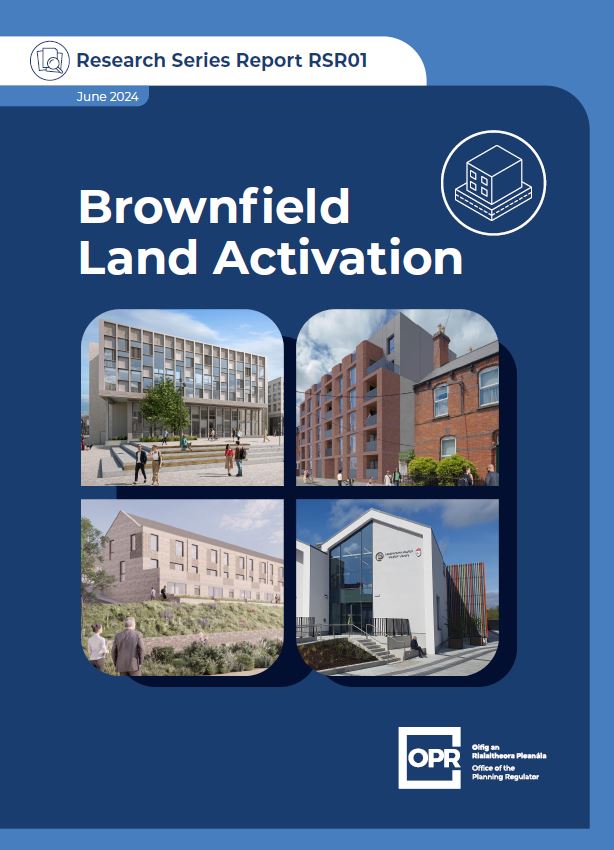
OPR- Brownfield Land Activation
This Research Series Report (RSR01) is the first in a series of OPR Research Series Reports. It focuses on 'Brownfield Land Activation'.
Research Series Reports are defined in the OPR's Planning Research Framework as discrete publications on a particular topic/issue that reflect the format of more conventional research reports found in professional journals or academic periodicals.
This Research Series Report was identified as a 'Strand One- Planning Issues' project in the OPR's Strategic Planning Research Programme 2023-2025. The report focuses on completed and ongoing brownfield urban regeneration and compact growth sites and provides an insight into the key planning and wider conditions essential to delivering more compact growth.
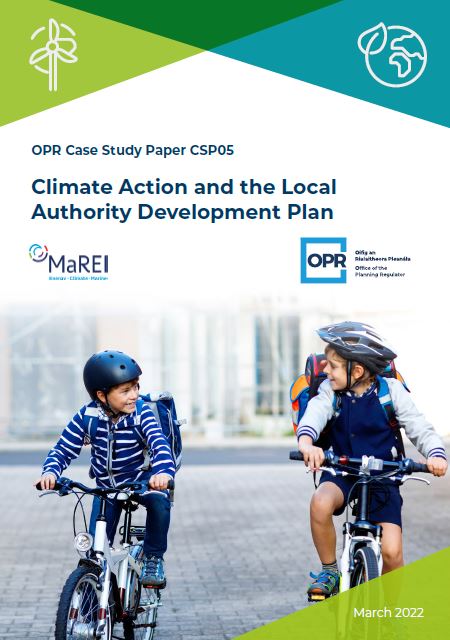
OPR- Climate Action and the Local Authority Development Plan
This Case Study Paper (CSP05) is the fifth in a series of OPR Case Study Papers. It focuses on 'Climate Action and the Local Authority Development Plan' and acknowledges the fact that climate action has become a major influence on planning policy. While climate action includes both mitigation and adaptation the policies needed to adapt to the effects of climate change have received more focus in recent times (e.g. flood risk) whereas the planning policies dealing with mitigation have not received the same focus. This Case Study Paper seeks to offer insights into the challenges local authorities experience when incorporating climate mitigation into development plans and highlights exemplary aspects of existing development plans that include climate mitigation measures.
In preparing the CSP three key steps were taken. Firstly, emerging and existing examples of how local authorities have incorporated Renewable Energy Strategies and other climate mitigation measures into their development plans were reviewed. Secondly 'pathfinder' local authorities were identified. The third step was engagement with a number of officials from the 'pathfinder' local authorities in order to gain an insight into their experience and learnings.
The main objective of the CSP is to support planning authorities and to provide practical comparative information that can be used for incorporating evidence-based and realistic climate mitigation measures into development plans.
The research was undertaken by the team at MaREI, the Science Foundation Ireland (SFI) Research Centre for Energy, Climate and Marine coordinated by the Environmental Research Institute (ERI) at University College Cork and was funded by the OPR.
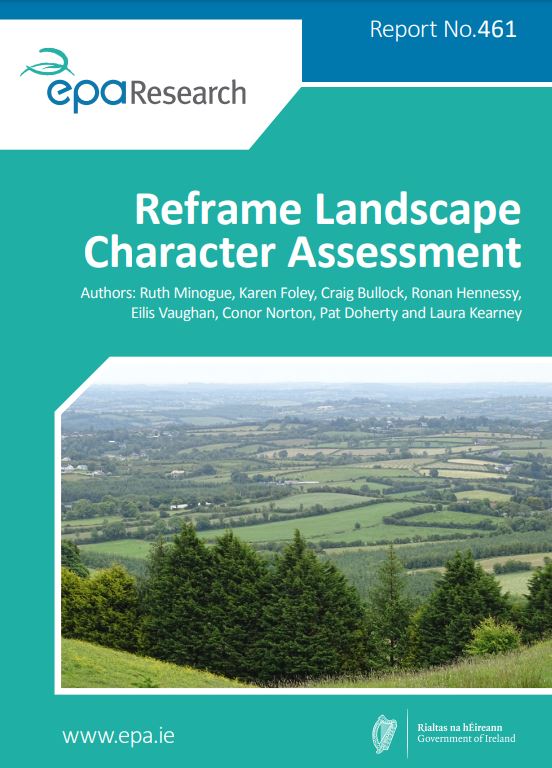
EPA - Reframe Landscape Character Assessment
In late 2021 the Environmental Protection Agency (EPA) issued a call for research proposals to address certain topics. One of these topics related to the development of a national landscape characterisation toolkit. Landscape character assessment is a tool that is used to describe the character of a landscape in ecological, cultural, social and economic terms. These are the features that give a locality its 'sense of place'. Landscape character assessment aids sustainable development and the protection of biodiversity including the enhancement, restoration and improvement of habitats. The overall objective of this particular research project was to develop a landscape character assessment toolkit that can be used as a decision support tool for land-use planning and environmental management. The intention was to ensure that landscape considerations are recognised as a key environmental component. This research project was funded by the EPA and the Department of Agriculture, Food and the Marine.
The project commenced in February 2022 and was led by Minogue & Associates, environmental consultants. The OPR was represented on the Steering Committee for the project. The research report and toolkit were published by the EPA in September 2024 and are available here. The OPR will support the EPA with the dissemination of this information. This project is consistent with the overarching goal and objectives of the OPR's Research Framework and aligns with the First Strand research on 'Planning Issues'.
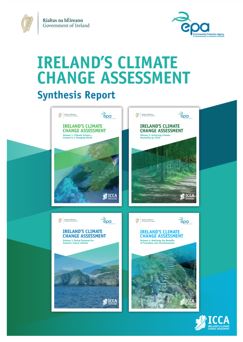
EPA- Ireland's Climate Change Assessment Report- Achieving Climate Neutrality by 2050
In 2021 the Environmental Protection Agency (EPA) commenced the preparation of a report entitled 'Ireland's Climate Change Assessment' (ICCA). This report was modelled on the structure of the UN Intergovernmental Panel on Climate Change (IPCC) assessments. The purpose of the EPA report was to develop an understanding of climate change, its impacts and the options for dealing with these impacts. The report will consist of four volumes and its intended that it will be reviewed on a five yearly basis.
One of the OPR's key statutory functions is to evaluate and assess development plans and to ensure that these plans contain specific objectives in relation to a number of key issues including proposals for dealing with climate change. In this context the EPA invited the OPR to join the Steering Committee for volume 2 'Achieving Climate Neutrality by 2050' of the ICCA report.
Throughout 2022 and 2023 the OPR actively engaged and contributed to the ongoing reviews of the various drafts of volume 2 of the report and participated in stakeholder workshops/meetings. Following the completion of the drafting phases and coordination of the four volumes, the ICCA report (volumes 1-4) together with a synthesis report was published in Q1 2024 and is available here.

International Centre for Local and Regional Development (ICLRD) Research Project-‘The InPLACE Project- Investigating Planning, Place-making and Commuting’
The OPR entered into a Research Partnership Agreement with the International Centre for Local and Regional Development (ICLRD) in 2021 to conduct research into the economic, social and spatial impacts of pre- and post-COVID commuting on communities and districts across Ireland.
The project title was 'The InPLACE Project' and the subtitle was 'Investigating Planning, Place-making and Commuting'.
The study was supported by the OPR, the Department of Housing, Local Government and Heritage, the Local Government Management Agency, Clare County Council, Cork County Council, the Department for Infrastructure in Northern Ireland, the Department of Transportation in Maryland, US and the Tomar Trust (a private philanthropic trust/organisation).
The purpose of the study was to assess the impact of out-commuting on settlements, and the impact of the pandemic with the enforced switch to home-working and tele-commuting.
The project was case study based and sought to get an in-depth picture of what happened pre-pandemic and is happening post-pandemic in a number of case study areas throughout the island of Ireland and the US. The case study areas were commuter towns that were selected for their scale and by reason of the fact that they are affected by out-commuting.
The project comprised two phases. The phase one settlements included the towns of Ennistymon, Lahinch, Co. Clare, Newtownmountkennedy, Co. Wicklow and Dundrum (Newry, Mourne and Down District Council). The phase two settlements comprised Kanturk, Co. Cork, Mountbellew, Co. Galway, Aghagallon, Co. Antrim and Sallins, Co. Kildare. The case study towns in Maryland were North Beach in Calvert County and Middletown in Frederick County.
The study commenced in April 2021 and was finalised in Q4 2024. It is envisaged that the findings from the research will have significance for a range of public policies, many of which are within the remit of local authorities, and all of which will influence local communities such as health, housing, environment, community development, social policy, transportation and spatial planning.
The researchers invited commuters, transport providers, community groups, local businesses, local government employees and elected members to share their experience of travel and transport since the arrival of the pandemic in 2020, and the impact on their quality of life and well-being. It investigated similarities and divergences between short and long-distance commuters, where a long distance commute is identified as lasting in excess of 45 minutes.
The research report was published and formally launched in Q4 2024 and is available via the folowing link.
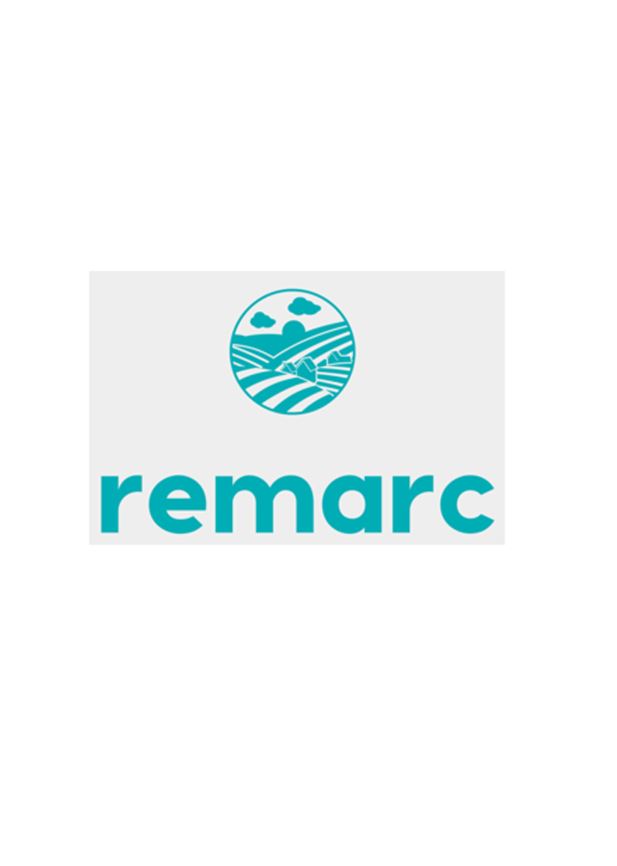
EPA Research Project – Remediation of Faulty Septic Tanks: A Mixed Methods Approach to Environmental Risk Communication (REMARC)
In March 2024 the OPR was invited to join the Steering Committee of the REMARC research project, funded under the EPA Research Programme 2021-2030. The EPA Research programme is a Government of Ireland initiative funded by the Department of the Environment, Climate and Communications.
REMARC is a multidisciplinary research project that seeks to identify pathways towards higher rates of septic tank remediation to safeguard the environment and public health. Through a cross-sectional survey and expert interviews, REMARC will gain insights from households and local authority officials about potential barriers to septic tank remediation in Ireland. The findings will be used to provide evidence-based policy recommendations and will inform the development of public communication framework designed to trigger positive behavioural changes.
For more information, please contact the project team via the contact details here.